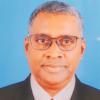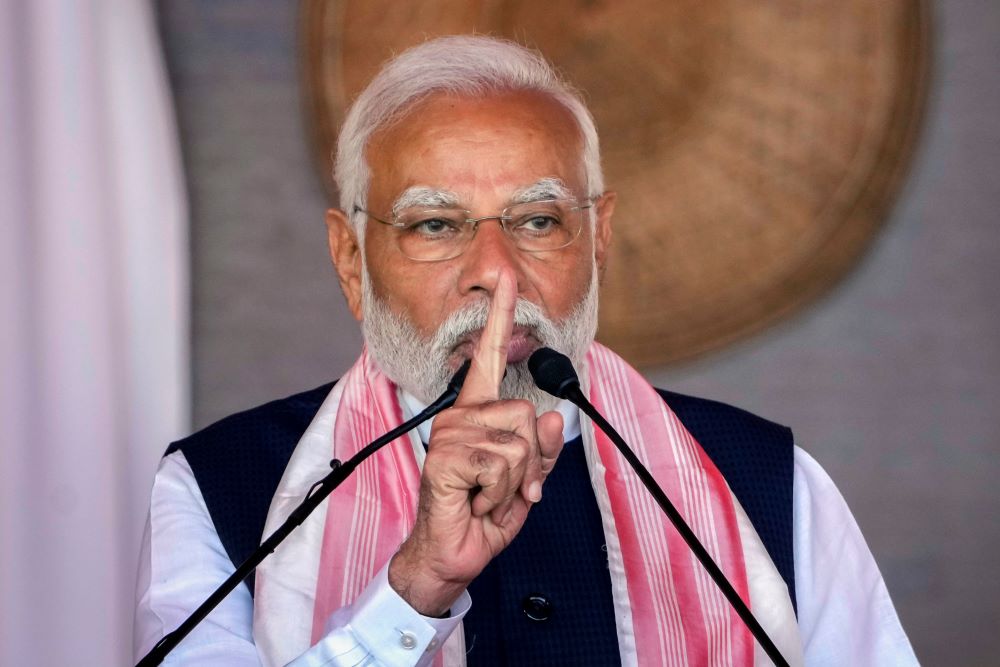
Indian Prime Minister Narendra Modi, who is running for re-election, addresses a public rally in Guwahati, India, on Feb. 4. India's Catholic bishops recently released a statement in which they worried the upcoming elections could lead to the creation of Hindu nation. (AP/Anupam Nath, file)
As India prepares to elect a new federal government this spring, its Catholic bishops have urged citizens "to vote wisely" to help the country remain a secular and democratic republic.
"We urge all citizens to enroll as voters and exercise their sacred duty to vote wisely, so that we elect leaders who are committed to constitutional values and to the uplift of the poor," said in a statement the Catholic Bishops' Conference of India issued at the end of their 36th biennial meeting.
As many as 170 bishops from India's 174 dioceses attended the Jan. 31-Feb. 7 meeting in the southern Indian city of Bengaluru. The meeting's central theme was "The Church's Response to the Current Sociopolitical Situation of the Country and the Benefits and Challenges of Artificial Intelligence (AI)."
The bishops, representing India's Latin, Syro-Malabar and Syro-Malankara rite churches, met as the current federal coalition government led by the Hindu nationalist Bharatiya Janata Party (Indian people's party) completes its second five-year term in May.
India's 966.8 million voters will elect the country's 543-member Lok Sabha (people's council), the lower house of parliament, in April and May.
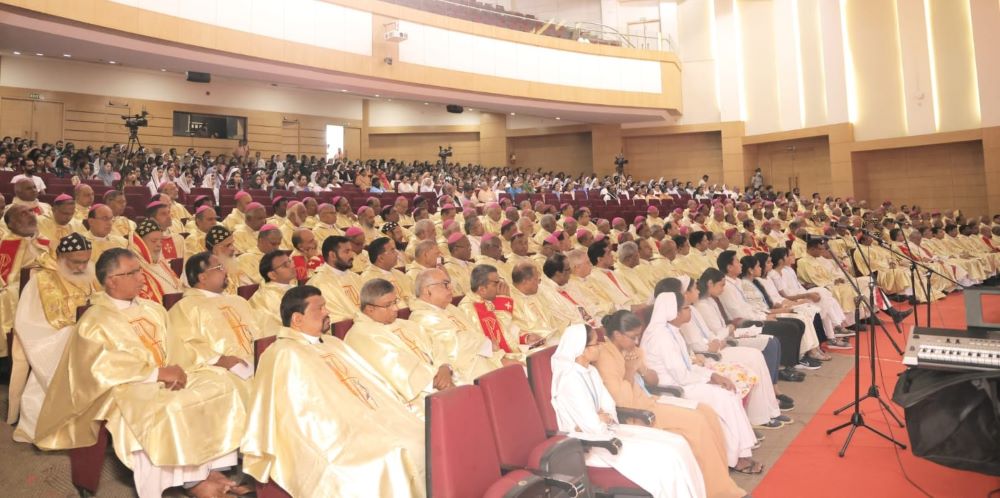
About 170 bishops attended the opening Mass of the 36th biennial meeting of the Catholic Bishops' Conference of India in Bengaluru, India. After the conference, the bishops called on Catholics to observe March 22 as a day of prayer and fasting "for peace and harmony in our country." (Courtesy of CBCI)
India and Pakistan were created in 1947 by dividing British India. While Pakistan opted to become an Islamic state, India decided to become a secular republic, giving equal rights and opportunities to all its citizens.
However, many fear the coming election may make way for declaring India a Hindu nation. Tushar Gandhi, the great-grandson of Mahatma Gandhi, sees such a possibility if the current coalition wins the elections.
"Secularism as a constitutional pledge will be scrapped and a monolithic state will be formed. That is definite. In that kind of a state, there is no place for democracy," Gandhi told The Hindu newspaper in October.
Ahead of the elections, the Catholic bishops have asked the country's dioceses to observe March 22 as a day of prayer and fasting "for peace and harmony in our country."
In their conference statement, the prelates say they worry that "divisive attitudes, hate speeches, and fundamentalist movements are eroding the pluralistic, secular ethos" of India and its constitution.
Their statement laments that Christians and their institutions serving the poor in the country face violence and harassment. They also cite harrassemen or accusations of religious conversion by Christian orphanages, hostels, educational and health care institutions. Destruction of Christian homes and churches have become common, they said.
"There is an unprecedented religious polarization which is harming the cherished social harmony in our country and endangering democracy itself," they wrote.
About 26 million Christians, or about 2.3% of the population, live in India.
A month before the bishops met, the ecumenical United Christian Forum said that 720 incidents of violence against Christians in India were reported in 2023. The figure excludes violent incidents between the Christian-majority Kuki community and Hindu-dominated Meiteis in the northeastern India state of Manipur.
The group received reports of 23 incidents of violence against Christians in the last seven days of 2023, the group said in a Jan. 3 statement.
Open Doors, a non-denominational Christian group, has ranked India 11th among countries persecuting Christians. The advocacy group said in December 2023 that India experienced a "sharp increase in targeted violence against Christians" since 2014, when the present regime first came to power.
The bishops pledge the church will continue to serve the poor, despite the violence.
"As loyal citizens of India, we will continue serving our country whatever be the cost, walking in the footsteps of Jesus our Master," they said in the statement.
They also urged people to become alert and pray for the safety of all.
The bishops also worry about the unequal distribution of wealth and development "that seems to have benefitted only a small percentage."
The bishops said they are "appalled by prolonged violence in Manipur resulting in the huge loss of life and livelihood." Ethnic violence in the northeastern Indian state began May 3 between Hindu majority Meitei and Christian-majority Kuki, two prominent communities there.
At the meeting, Archbishop Linus Neli of Imphal, the head of the Catholic Church in Manipur, discussed the violence that has destroyed some 300 churches and thousands of homes.
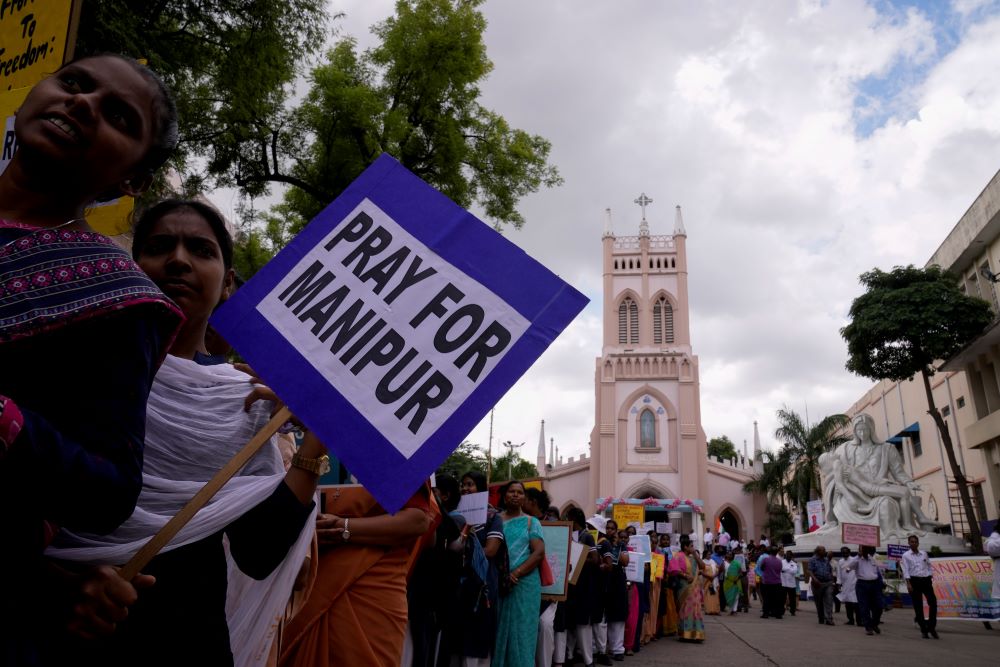
Catholics hold placards and participate in a peace rally against violence in the northeastern Manipur state, in Hyderabad, India, on Aug. 25. Ethnic violence began there May 3 between the Hindu majority Meitei and Christian-majority Kuki. (AP/Mahesh Kumar A.)
The bishops' statement has received mixed response.
While some Catholics applauded the bishops' grasp of the country's current situation, others wanted them to be bolder in listing India's problems.
AC Michael, president of the Federation of Catholic Associations of Archdiocese of Delhi, congratulated the bishops for leading the church. A Feb. 8 federation statement says it is "encouraged" by the bishops' call to political parties to preserve the Indian constitution.
Apostolic Carmel Sr. Maria Nirmalini, head of India's 130,000 Catholic religious, found the prelates' statement prophetic and timely, "given the sociopolitical situation in our country."
Also pleased was chhotebhai, convener of the Indian Catholic Forum, a lay organization. He told NCR that the bishops understand the gravity of the challenges Christians face in India.
He wants the prelates to take steps to support India's 26 million Christians (about 2.3% of the population), along with their call to pray for the nation.
"This is just one more missed opportunity limited to grandstanding," said chhotebhai, who dismissed the statement as "full of usual pious platitudes."
Advertisement
John Dayal, a human rights and political activist, was also disappointed with the bishops' statement.
"On one hand they issue statements to express their frustration against the anti-Christian policies and actions of the federal government, but on other, they try to appease the rulers," he told NCR.
Dayal was among hundreds of Christians who had criticized bishops who attended a Christmas party Prime Minister Narendra Modi hosted at his New Delhi home.
Cardinal Oswald Gracias, archbishop of Bombay and a member of Pope Francis' Council of the Cardinal Advisers, attended the party and thanked Modi for his efforts toward India, the Christian community and the world.
Archbishop Anil Couto of Delhi, another Catholic prelate at the party, praised Modi's "wonderful vision" to carry everyone together for the good of all.
Dayal does not oppose bishops visiting the prime minister, but said they should voice their concern over "the state-sponsored violence" in Manipur.
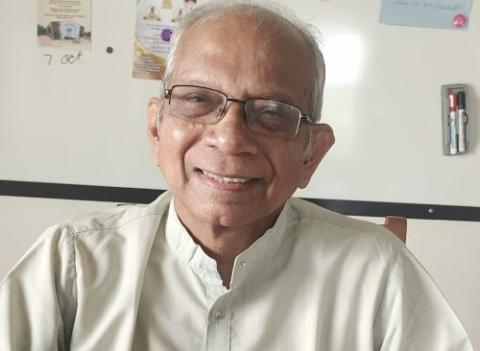
Jesuit Fr. Cedric Prakash, a human rights activist in India, wants the country's bishops to be more proactive than drafting statements. (Thomas Scaria)
Sunny George, a member of the Focolare Movement in Bengaluru, sees no problem in bishops meeting political leaders.
"The Catholic Church has to develop a cordial relationship with political parties if it wants to change their mindset," he told NCR.
Jesuit Fr. Cedric Prakash, another human rights activist, wants the bishops to be more proactive than drafting statements.
"The recommendations in the statement should have been more specific and clearer, and provided definite directions," he told NCR.
The Jesuit said that the bishops were too slow to respond to the Manipur crisis.
The bishops' meeting came eight months after the Manipur violence started, but neither the government nor the church could do anything creatively to end it until now, he said.
Prakash said the Indian church has unwittingly cooperated with the Hindu nationalists' gameplan in Manipur by offering to shelter the victims elsewhere in the country. "The whole aim of the government was to drive out the Kuki people from the state and we have made it easy for them," he said.
Bishop Joseph Mar Thomas of Bathery, the bishops' conference's second vice president, told NCR that their meeting did not consider the Manipur problem as a Christian-Hindu conflict.
"The Manipur issue is so complex. It has more to do with an ethnic crisis than a religious issue, and we cannot equate it like any other anti-Christian violence in the country. But the church has a responsibility to its victims," said the Syro-Malankara prelate.
